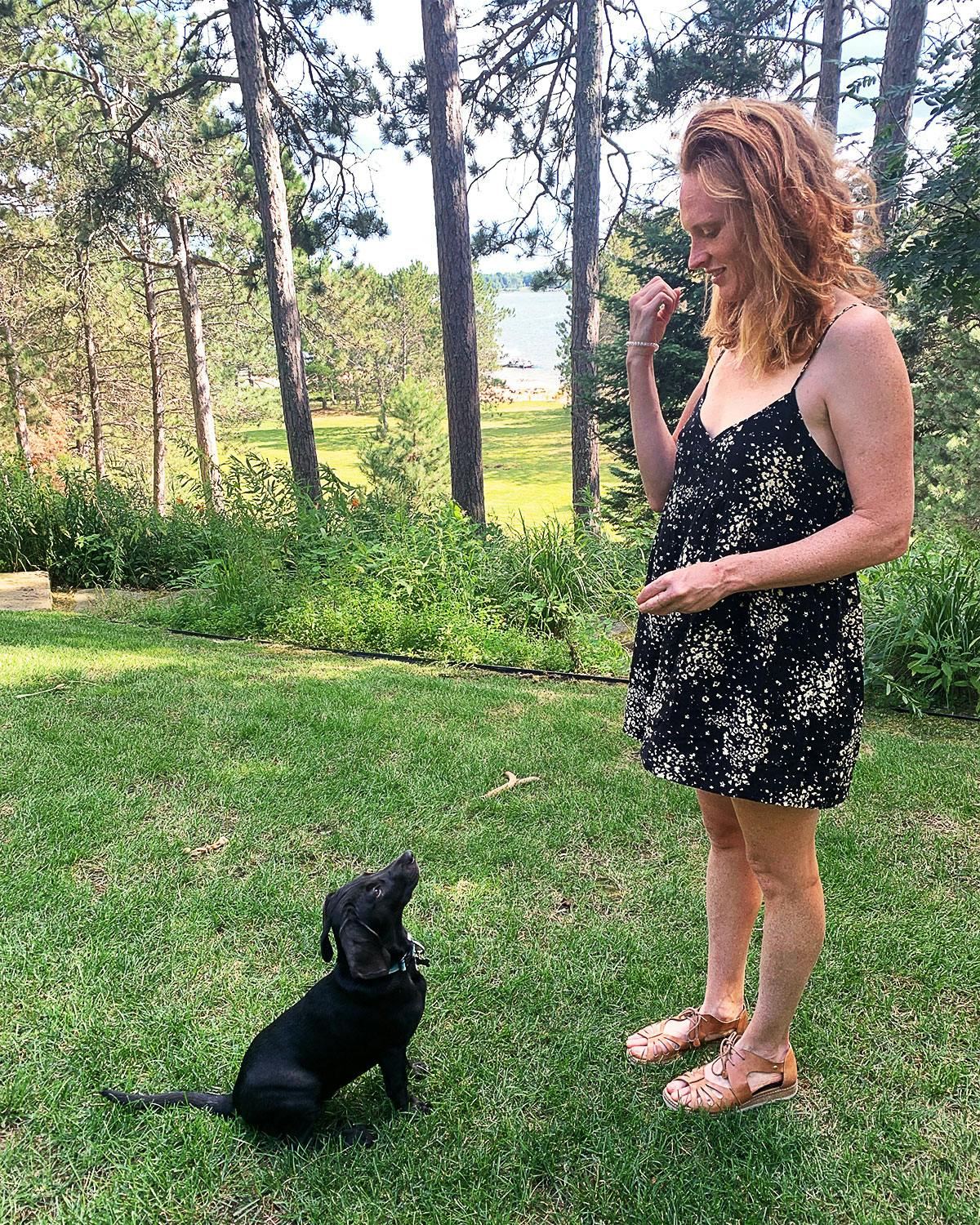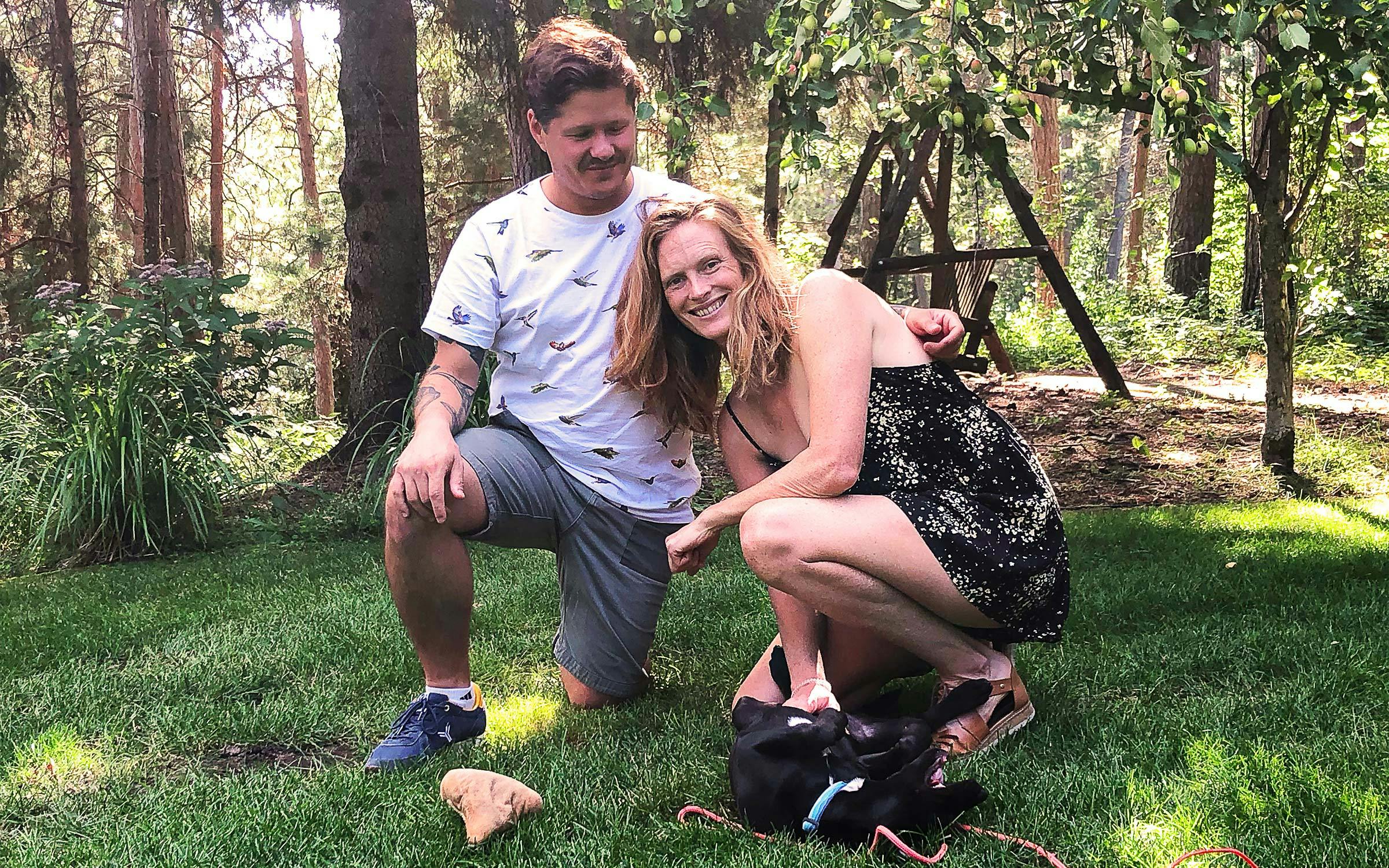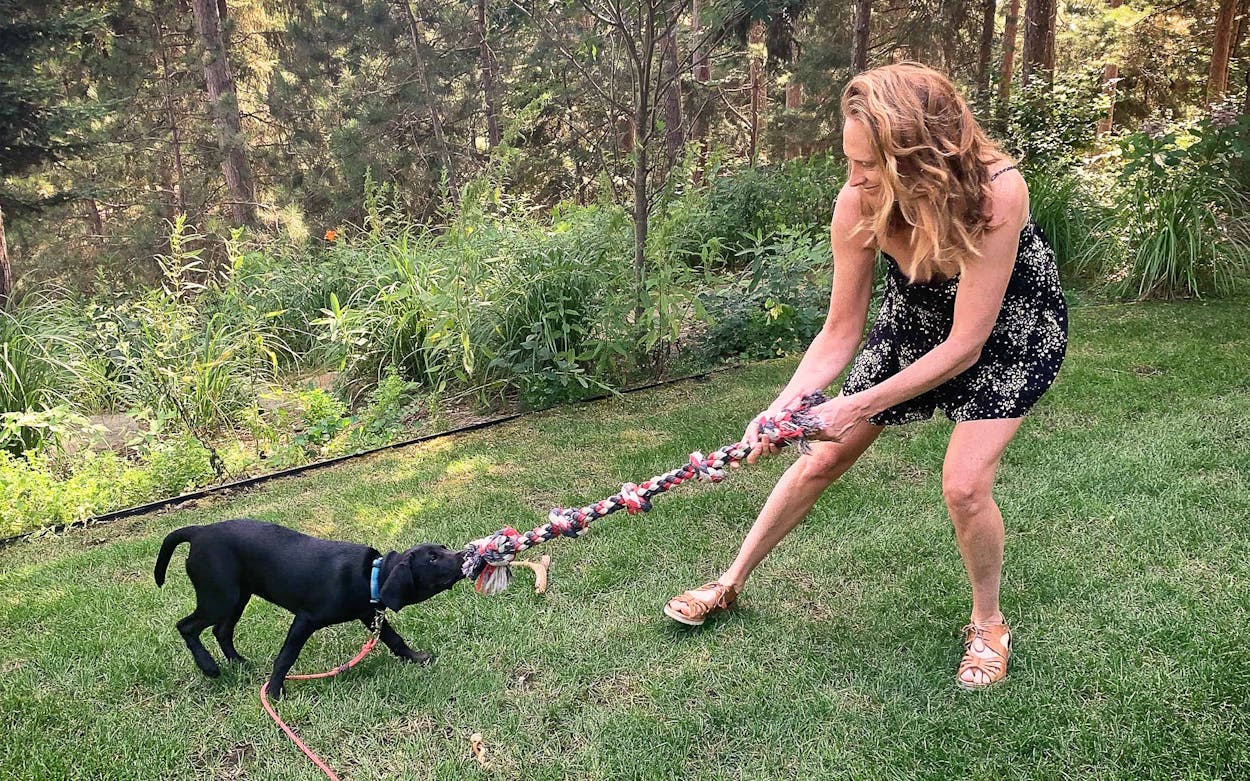Sit, I tell Penny. I place the piece of pepperoni on the floor and hold my finger. Wait.
Her nose quivers and her eyes darken with reproach. Give me that goddamn treat. She looks away, a hunger artist in agony. Wait, I say, and stand up. She leaps at the pepperoni and I snatch it before her nose gets there. We regard each other with disappointment. Sit, I say, placing the greasy meat down again. Wait.
An hour later, with Penny napping in her crate, I turn on KUT for the latest COVID statistics. It’s July 2020 in Austin, and virus fatalities are climbing higher than the triple-digit temperatures outside. We’re at Stage Four of quarantine guidelines, which means shelter in place, except for grocery shopping and outdoor exercise. No indoor dining, dinner parties, or tipsy nights of two-stepping at the White Horse. Every week it’s the same:
Sit.
Wait.
Wait.
Sit.
Alejandro, my boyfriend, and I trade off taking care of Penny in the mornings so the other person can write. We are following the advice of a book titled, with no irony, Training the Best Dog Ever. While it is true that Penny is the best dog ever, she is not eminently trainable. The book promises a simple five-week program, but we’ve been stuck on week three for the past month.
During my mornings with Penny, I try to find a routine. You are supposed to make your puppy sit in the crate, sit again outside the crate, sit before the door, sit outside the door, and then sit again after they pee, at which point you give them a treat. I aspire to this regime, but inevitably just open her crate door, pet her a lot, take her outside, forgetting a treat, and then run back to feed her breakfast when she’s done.
One semester in college, I volunteered to coach indoor soccer to third-graders. I showed up with a scribbled plan of passing and shooting drills, but the kids kept running out of the gym. Eventually, I abandoned soccer entirely and switched to three-legged races. (It was harder for them to escape when they were tied to each other.) I’ve never known whether to count that lesson-plan pivot as a success or a failure, but it evinces how hard it is for me to set limits—whether they’re for dogs, other humans, or myself (although setting sky-high expectations has never been a problem).
Training a dog is difficult because you have to train yourself to be a trainer: to find a diction of discipline that works with them. To be stern at times, supple at others. To “set them up for success,” to borrow a phrase from Training the Best Dog Ever.
But Penny, just like any hedonistic toddler, doesn’t give a piece of pepperoni about any of that. She just wants to poop on the porch, bark her displeasure, and eat the cat’s food. Instead of walking around the block, she’d rather smell all the animal gossip on a blade of grass for four minutes, like it’s a Shut up, she said what? Facebook post. I’m trying to figure out how to make peace with her puppyness and keep some semblance of a work schedule. So far, giving her bull penises and tossing her into the neighbor’s yard to play with Bullet, their French bulldog, have been the best ways to achieve that.

The pandemic hurls its own commands at my schedule, drawing my daily activities in tighter and tighter circles around my home, just as I clip Penny’s leash to a peg in the front yard, articulating her orbits. I untangle her when she winds the leash around a bush and doesn’t realize that to free herself, she must simply go back the way she came. Now that the pandemic has tightened my leash, harnessing me to home, I alternate between yelping with fury and learning every inch of the front yard, as Penny and I stare at the hawks (or are they vultures?) circling above us.
With no set schedule, now that my teaching semester is finished, I am both trainer and puppy as I move through a quarantined summer. On the one hand, it seems so simple, so imminently doable to take this time without distractions to hone my writing process, keep the house clean, read a bunch of books, stay on top of finances, train a tiny puppy, enjoy nights (and days) in with my partner. But rigor, in excess, is boring. You need a liquid curiosity to lubricate the day—a lesson that is hard not to take literally, in the form of a few margaritas each night. How to set limits—on drinks, on words, on miles walked—and still have fun, and still feel alive? Especially when we have a president that I wouldn’t trust with a puppy, let alone a virus- and injustice-ridden nation.
So far, with Penny, the best training tools are treats and silent treatment. I lavish her with little greasy prizes when she behaves, while acting like a stone-cold seventh-grade bitch icing her out at the cafeteria when she doesn’t. Rewarding and ignoring. Turns out that a similar approach can be helpful for my pandemic psyche, too. Lots of little rewards—an episode of Schitt’s Creek, a new type of conditioner, a slice of takeout pizza from Bufalina—and some talk to the hand to what doesn’t serve me. I try to turn off the howling news cycle when I need to, along with the whining inner voice that says I’m not productive enough. Or the high sharp barks that urge a night lost to drinking, or twenty minutes spent fighting with Ale, just to feel something, some adrenaline and momentum, even when it’s the wrong kind.

In March, when the virus first struck, Alejandro and I were supposed to run a half-marathon, my first. We had been training for the last three months. It was canceled at the last minute because of COVID. We agreed to run thirteen miles on race day anyway, but during the week leading up to it my throat felt sore, and my breathing was ragged. Was it the virus, or just the joint I’d smoked on Saturday night? Or all the pollen in the air? We shrugged and said we’d run it in two weeks, but we never did. After my left Achilles started aching a few weeks later, I stopped running altogether. “I want to take this quarantine time to get really healthy,” I told my therapist in early April. “Why don’t you take it easy on yourself instead?” she suggested. “It’s an exceptional time. Stay gentle.”
Ten pounds later, I feel ashamed of the consequences of my ease. But I also know that punishing myself or imposing a stricter regime will not work, either, in this pandemic of pain and need. Raising a puppy reminds me that discipline is as much about trust as it is about adherence or obedience. I pray things shift this autumn. That a vaccine will be closer to development. That hospitalizations plummet. That the country chooses new leadership. That Penny and I learn patience.
But is it really patience, that “minor form of despair, disguised as a virtue,” as Ambrose Bierce wittily defined it, that I want to embody? A better trait, perhaps, is one that Penny first taught me: staying open to possibility. Two months into the pandemic, dogless, sitting on my porch, pulling my daily tarot card, I saw a tiny black shape wander into the street from my neighbor’s yard. I flew downstairs, grabbed the wiggling pup, and deposited her behind the neighbor’s fence. An hour later, she was out again, and licked me all over as I held her, whining when I put her back. “I’m taking her to animal control when I can get an appointment,” my neighbor said, later that afternoon. “I found her under the car three days ago, but nobody came to claim her.”
I’d wanted a dog for fifteen years, but the timing never felt quite right. The tarot card I pulled that morning was the Queen of Wands, a figure of receptivity (not to be confused with resignation). As Jessa Crispin writes in The Creative Tarot, “The Queen of Wands does not go hunting for what she wants; she waits for it to come to her. … Knowing what we truly want, rather than what people say we want, is a surprisingly complicated task. Be certain what it is that you want, and then draw it to you.”
Who was I to resist Penny’s delighted squeal-grunts when I first petted her, the same sweet nothings I now receive each morning when I take her out for a walk? I named her Penthesilea after an Amazonian queen, a manifestation of the Queen of Wands. In training Penny, my goal is not to make her meek, but to attune our needs. Maybe enduring quarantine, too, has less to do with patience and more to do with a focusing of desire. I’m trying to use the time inside my house to go inside myself, to discern what is seducing me and why. It’s nearly as crucial to name what we need—from canines, loved ones, and leaders—as it is to protect ourselves from the virus. We must sit and wait and want, and then, when the time is right, leap at the chance, cast our ballots, and—hopefully—breathe more freely.






